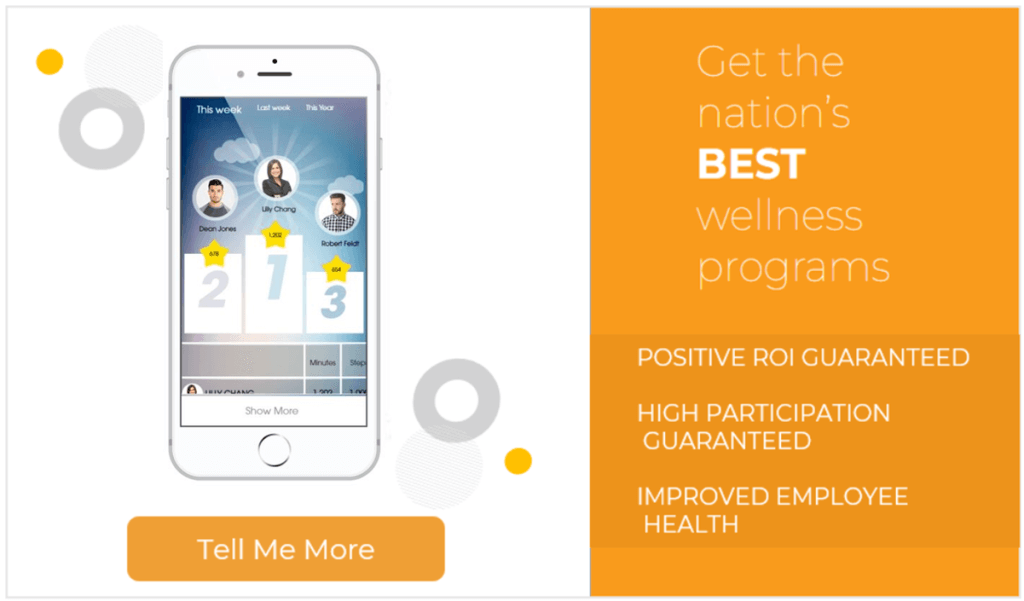Executive Summary
How can an individual improve their work performance?
An individual can improve work performance by building healthy daily habits that support focus, energy, and resilience. Prioritizing sleep, nutrition, movement, stress management, and clear goal-setting helps employees think better, work more efficiently, and stay engaged. When people take care of their physical and mental well-being, their productivity, confidence, and consistency at work naturally improve.
What does it mean to be a high performer at work?
Imagine if our minds were upgradable, and anytime we wanted to increase performance all we had to do was walk into the nearest parts store, scan their inventory, and decide the financing terms. While we might not be able to program our brains, there are plenty of ways an individual can improve work performance.
We hear about increasing our performance at work, but what does that really mean? In today’s article, we’re going to look at ways we can improve performance, and what that really looks like.
Explaining performance might sound complicated given the versatility of so many industries, but regardless of the job, there are steps each of us can take to help us better perform the tasks we’re responsible for without contributing to increased stress and anxiety.
The first thing to understand about high-level work performance is that most of the things a person needs to succeed should be taken care of by the people employing them. In order to be a high performer, there are things the management team should implement before the person’s first day on the job.

In an ideal world, employers would already have this ready to go on the person’s first day, or at least within the first few weeks of their start date. However, performing well at work means you need to understand what is expected of you, even if the company is ambiguous about it.
Performing well at work means you need to understand what is expected of you, even if the company is ambiguous about it.
High-level performers don’t wait to be told what their responsibilities are; they take the time to find out.
RELATED: 10 Ways to Create a Productive Workforce in Your Organization
What do high-performing professionals understand about work performance?
They know their responsibilities.
A common occurrence in underperformers is that they don’t understand all that is being expected of them. It’s important to take the initiative so you have a grasp on your responsibilities, and in some cases, documentation of those responsibilities. Many times, companies will already have this available, and it is important to know the things you will be expected to do.
They ask supervisors to clarify how they evaluate performance levels.
It’s not enough to know what responsibilities you might have; you need to understand how those responsibilities will be measured by superiors because in most cases, that is what your job stability relies on. Taking the time to learn your company’s expectations allows you opportunities to be prepared for things not covered in an interview, and the ambiguous responsibilities of your profession.
They spend their time on accretive tasks.
One thing high-performers have in common is that they focus on value-adding tasks (usually, the ones that generate revenue), and delegate less important or non-value-adding tasks. Too often the people underperforming are managing tasks that are necessary but are overall unimportant to the performance levels the company is trying to achieve.
RELATED: The Correlation Between Wellness Programs and Increasing Productivity in the Workplace
In a study conducted by The Harvard Business Review, they found that when employees delegated between 2% - 20% of their work, they saw a “stunning three-week sales jump of 5%, with the biggest increases coming from below-average performers.”
They ask for feedback.
Feedback isn’t always easy to take, especially with a harsh delivery. However, taking the time to put emotions aside and learn how you’re performing is one of the best ways an individual can improve work performance.

As hard and an unfavorable critique might feel in the moment, if you allow yourself to stop and take the time to evaluate the feedback, you will find ways to improve. While people might not complete the tasks in the same process as their superiors, it is important to take the feedback into account when trying to increase performance.
RELATED: 13 Office Wellness Ideas to Improve Employee Productivity in 2023
Why is improving work performance easier said than done?
If you look at the above list and feel the first swarms of anxiety tightening your chest, you are not alone. Most people want to perform well in their job, but there are many contributors to underperformance.
Before becoming a high-performer, there is something far more important you might not be considering. Any idea what this majestic solution might be?
How does wellness influence individual work performance?
Companies with a focus on wellness retain high-performing, happy employees. Can you guess the keyword in the previous statement? No surprise, it’s happiness.
Happy people are productive, and more than that, they promote the productivity of others. When people are happy, they brighten rooms rather than dim them. Companies with a strong emphasis on wellness create happy employees.
Although it might seem obvious that happy people are likely to perform better, the question is why. Why does happiness improve work performance. Here’s the misconception about happy people: they’re not always happy.
People with good attitudes are some of the most uplifting to be around. But people might not connect their positivity to the fact that most of these people take their wellness seriously.
Wellness is so much more than a meditation app (but we love those too!). It’s a lifestyle, and those who participate are often high-performers with a better quality of life.
Wellness is a lifestyle, and those who participate are often high-performers with a better quality of life.
RELATED: How Wellness Programs Help Improve Employee Morale
Do healthier individuals perform better at work?
One thing we learn more and more each day is that wellness works. But don’t just to take our word for it. The folks at Johnson & Johnson Co. have been gathering data on their corporate wellness programs since 1979. They’ve seen continued work performance improvement in their assessments.
Furthermore, the company not only increased revenue, but also saved a significant amount of money on employee health-related expenses.
“[Johnson & Johnson’s cornerstone] Health & Wellness initiative achieved savings of about $9-10 million per year primarily from reduced medical utilization ($3.96 million) and lower administrative expenses ($5.22 million).” Goetzel RZ, Ozminkowski RJ, Bruno JA, Rutter KR, Isaac F, Wang S. The long-term impact of Johnson & Johnson's Health & Wellness Program on employee health risks. J Occup Environ Med. 2002 May;44(5):417-24. doi: 10.1097/00043764-200205000-00010. PMID: 12024687.
The thing that Johnson & Johnson learned when they introduced their Wellness program, was just how important it was for their employees to take care of themselves. When people take care of themselves, they are less likely to have health problems and more likely to understand how to keep their lives balanced.
J & J helped found the wellness movement, but as the data and research continue to confirm positive results, most companies have implemented some type of wellness platform. Good wellness programs are designed to help people manage more than their physical health; they support mental and emotional health.
Employers that focus on wellness programs are the companies with the most productive workers and have less turnover. The bottom line is that if you want to be productive, you need to work for a company that supports you, and the best indicator of that support lies in their wellness package.
RELATED: The Correlation Between Wellness Programs and Increasing Productivity in the Workplace
Why does wellness lead to better workplace performance?
Happiness is something we all want to achieve, and one thing we need to keep in mind is that happiness is an emotion and like all emotions, is a fleeting feeling. That’s not to say we can’t experience that emotion consistently, but instead of such a strong focus on happiness, why not give peace a try?

We all enjoy smiling and laughing, but once the feeling begins to ebb, having a balanced and peaceful life welcomes an abundance of happiness. The key to balance in life is to focus on overall wellness and health, and it’s important to be in an atmosphere that supports it.
We Stress Less.
People that focus on things like exercise, a balanced diet (that includes an occasional bowl of ice cream), and strong mental health perform better. Why? Many physical, mental, and emotional issues can be helped by eating right, exercising, and seeking medical advice for treatment. When we treat our bodies with respect, they will perform better.
We Sleep Better.
Stress, anxiety, fear, pain, sickness, sadness…so many things keep us up at night. Sleep can feel like the enemy when we’re plagued with constant worry. However, when we take care of our bodies, we sleep better. When we sleep better, we’re alert, energized, and process our thoughts with clear direction instead of walking around in a cloudy haze.
We Meet Goals.
Are you tired of the constant push against deadlines, feeling like you’re constantly three projects behind? When we exercise, eat well, and confront mental mind-clogs, meeting the responsibilities of our job doesn’t feel like such a daunting task. When we learn how to meet our goals, we can then learn how to enhance them.
When we learn how to meet our goals, we can then learn how to enhance them.
We Take Pride.
We want to improve our performance because we want to be proud of the work we do. When we nurture our ego with conscientious parameters, instead of feeding it like an endless fire, we begin to understand our value. When we feel valuable, it’s easy to produce amazing results.
RELATED: What Happens After 2 Years of Employee Health and Wellness Programs?
What key steps can individuals take to improve work performance?
The first step for an individual to improve work performance is to proactive and learn everything they can about their roles and responsibilities. Companies often supply general information about the responsibilities of a position, however, there are usually areas of ambiguity.
What High Performers Understand
- They know their responsibilities
- They learn how supervisors will evaluate their performance
- They spend their time on accretive tasks
- They ask for feedback
They Focus on Wellness
When we see movies with savvy professionals, they tend to have a type of polished look. In real life, it is often the same. We radiate a healthy glow and confident disposition when we focus on wellness. When we feel confident, we take pride in ourselves and present a person to the world we can be proud of, not by meeting some outdated model of social appeal.

On the contrary, when we feel sick, or are in pain, be that emotional, mental, or physical, it can feel impossible to perform. That’s why wellness plays an important role in individuals that want to improve their work performance.
Statistics show that wellness programs save money on health-related costs, increase productivity, and keep a team of healthy, happy people. Well people perform better, and opportunities will continue to open up for them when they perform better.
Statistics show that wellness programs save money on health-related costs, increase productivity, and keep a team of healthy, happy people.
People that focus on wellness are high-performers because they pay attention to the foundation of their success: health.
Unhealthy people have a harder time performing, not due to lack of skill, but because of the constant burden, due to poor health. When those same people are put in an environment where good health is promoted, good results are inevitable.
RELATED: How Wellness Programs Help Improve Employee Retention
Well People are High-Performers
They stress less. When people take care of their bodies, they can focus on their responsibilities and goals. When they focus on those goals and responsibilities, they increase their work performance.
They sleep better. When people exercise, eat right, and stress less, they will get more rest. Well-rested people have higher brain function and can achieve results.
They are proud of their work. Feeling unsatisfied with your work isn’t a good feeling, but when you are able to meet your goals, you will find a strong sense of accomplishment. Ego’s get a bad rap, but we need them, and when we nurture them rather than antagonize them, we produce work we find pride in our work.
Wellness is not one thing; wellness is a compilations of the different aspects of ourselves that needs care. In all the relationships we have in our life, the most important relationship is the one we have with ourselves.
When we focus on our wellness, we will achieve our goals, increase our performance, and have an overall happier life.
We invite you to enjoy a free demo with our Wellsteps team and discover exactly how we can help you put your company’s wellness program together and enjoy all the benefits we’ve discussed today.
